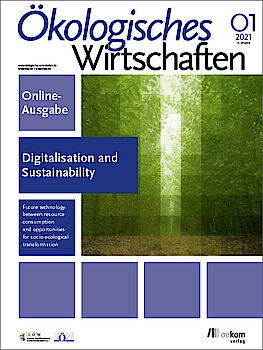A solution to pressing sustainability challenges? Or an impediment to the socio-ecological transformation? The impact of digitalization on sustainability is still difficult to answer. In the journal OekologischesWirtschaften(Ecological Economy), authors provide an insight into current issues and possible answers in 12 articles. The journal is published by the research group "Digitalization and Sustainability" a cooperative project between the Einstein Center Digital Future (ECDF), the Technical University of Berlin and the Institute for Ecological Economy Research (IÖW). For its 35th anniversary, the journal is being published digitally and in open-access format for the first time.
ECDF professor Tilman Santarius (TU Berlin) is part of the research group and again emphasizes the importance of the topic: "Especially through the Corona pandemic we have seen that digitalization and sustainability are connected and can have a positive effect: Due to the political measures, more people work from home, travel less and use video conferencing instead; this has - at least temporarily - helped to consume less energy and resources. The answers to the questions need to be interdisciplinary because digitization and sustainability affect so many different areas of our lives."
The current issue presents the topics of the research group's science policy workshop series "Forum Bits & Trees" (Forum Digitization and Sustainability), which is funded by the German Federal Ministry of Education and Research (BMBF). How is the interdependence and coevolution of human economies and natural ecosystems affected by increasing digitization? How can comprehensive governance arrangements, and in particular policy, steer digitization towards sustainability? On the one hand, digital tools and applications can serve as levers and trigger dynamic sustainability transformations in different sectors. On the other hand, digitization can aggravate existing trends of social exclusion and digital enhanced control, as well as encourage further economic growth, which in turn requires additional energy and resource consumption. The articles in the current issue address overarching issues central to the Ecological Economy, with a focus on policies for sustainable digitization.
Platform economy, ICT hardware, artificial intelligence.
The authors of the research group, together with co-authors from academia and civil society, outline how governments can build a sovereign digital infrastructure and counter the centralizing tendencies of the platform economy. Two articles highlight the environmental and social impacts of the production, use, and disposal of ICT hardware and the design, use, and traffic of software. The first article illustrates that an increasing number of digital devices not only entails growing energy and resource requirements, but can also cause massive human rights violations. The second article argues from a civil society perspective that the potentials of open hardware and software can only be realized if competencies go beyond the mere use of digital technologies. The researchers of the IÖW and the TU Berlin/ECDF also point out the manifold ecological, social and economic challenges associated with the use of AI-based systems.
To read the current issue, click //here.
More about the research of ECDF professor Tilman Santarius can be found //here.

